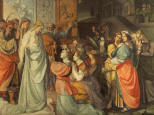The Lord is gracious and compassionate, slow to anger and rich
in love. The Lord is good to all; he has compassion for all he has
made (Psalm 145 v.8-9)
Healing is like rain. What I mean to say is that healing is
the product of the showers of truth. When we allow light and truth to enter our
hearts, healing is the result. I have discovered recently that the torrential
thunderstorms of life that I tried to avoid, in reality, brought the best crops
of restoration, joy, and peace in my life.

Healing comes in the unsettled ways live reaches us: death, relocation,
new job, and separation from my family and home. I know because all these
things hit my life. I uprooted myself
from everything I had a new call to move to South Africa. I had a call I was to
begin a journey, a supposed adventure but it was at the cost of the familiar.
What began as an adventure turned out to be one of the
hardest things I’ve ever experienced? I left my classroom of 10 years, my home
of 10 years, and my family. Nothing stays the same. Neither people nor places. So,
when I returned I was hit with a full storm of emotions: who was I? Where did I
belong? How would I or could fit into two worlds? The deluge of coming home to
what was not really my home anymore and saying associates and students who no
longer associates was more than unnerving. Add to that my church closed the
same month I came home. The deluge
seemed ready to sink my craft. Bolts of lightning and frightening rumbles of
terrible thunder rocked my world as relationships came unglued and the support
I thought would be forthcoming did not appear. Luckily, my small boat was tied
to a larger one whose Guide is God.
In the midst of this storm, there was a pilot on the boat next
to. He pulled my small ship closer to his larger one and I grabbed the ladder
that he had thrown overboard and quietly gathered the strength to enter into
his boat. There his gentle ministrations brought healing to my chafed spirit
and soul: un-dealt with issues, unmet desires, unhealed hurts. All these
rivulets of scars He healed with His tender attentions.
Hebrews 12 states no discipline seems pleasant at the time
but it achieves a harvest of righteousness for those who are trained by. That
difficult season in my life has produced a firm foundation. I trust completely
in God to captain by ship. I do not rely on men to do what only God can, and I
resolutely know that no matter many storms hit my life, He will bring my safely to harbor. Psalm 145:
17: God is just in all his ways; and is kind in all he does. If I did not
believe that, I would have given up a long time ago. Meditate on these promises from Psalm 145:
“The Lord upholds all those who fall down and lifts all who were bowed down
(v.14). “The Lord is near to all who call on him to all who call on him in
truth. He fulfills the desires of those who fear him; he hears their cry and
saves them" (v.18-19).
I pray that no matter what storms hit your life; you will
not get out of the boat with Jesus -even if he is sleeping in the stern. One
cry from your voice will awaken and will speak Peace to you and the storm, If
He doesn’t quiet the storm outside of you, He will quiet the one within, just
as he did for me.
Standing under the umbrella of Grace.
MJ

